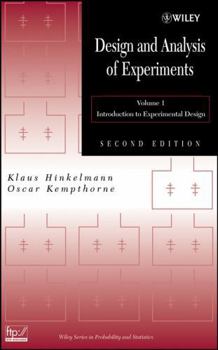Design and Analysis of Experiments, Volume 1: Introduction to Experimental Design
Design and Analysis of Experiments, Volume 1, Second Editionprovides a general introduction to the philosophy, theory, andpractice of designing scientific comparative experiments and alsodetails the intricacies that are often encountered throughout thedesign and analysis processes. With the addition of extensivenumerical examples and expanded treatment of key concepts, thisbook further addresses the needs of practitioners and successfullyprovides a solid understanding of the relationship between thequality of experimental design and the validity of conclusions.
This Second Edition continues to provide the theoretical basisof the principles of experimental design in conjunction with thestatistical framework within which to apply the fundamentalconcepts. The difference between experimental studies andobservational studies is addressed, along with a discussion of thevarious components of experimental design: the error-controldesign, the treatment design, and the observation design. A seriesof error-control designs are presented based on fundamental designprinciples, such as randomization, local control (blocking), theLatin square principle, the split-unit principle, and the notion offactorial treatment structure. This book also emphasizes thepractical aspects of designing and analyzing experiments andfeatures:
Increased coverage of the practical aspects of designing andanalyzing experiments, complete with the steps needed to plan andconstruct an experiment
A case study that explores the various types of interactionbetween both treatment and blocking factors, and numerical andgraphical techniques are provided to analyze and interpret theseinteractions
Discussion of the important distinctions between two types ofblocking factors and their role in the process of drawingstatistical inferences from an experiment
A new chapter devoted entirely to repeated measures, highlighting its relationship to split-plot and split-blockdesigns
Numerical examples using SAS(R) to illustrate the analyses ofdata from various designs and to construct factorial designs thatrelate the results to the theoretical derivations
Design and Analysis of Experiments, Volume 1, Second Edition isan ideal textbook for first-year graduate courses in experimentaldesign and also serves as a practical, hands-on reference forstatisticians and researchers across a wide array of subject areas, including biological sciences, engineering, medicine, pharmacology, psychology, and business.





